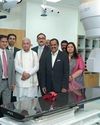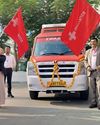
The healthcare sector has seen many developments and innovations in the digital healthcare space worldwide. The innovations span across the spectrum including new drug discovery, drug delivery methods, packaging and distribution, diagnostics, and treatment methods. One of the disruptive tech-led innovations of the 21st century has been the assistive robotic technology for surgeries. Due to its rising popularity, the minimally invasive surgeries are today almost becoming synonymous with robot-assisted surgeries in India's top metropolitan centers.
The robot-assisted surgery (RAS) helps the operating doctors to perform surgical procedures with precision, flexibility, and control. With chronic and infectious diseases on the rise, higher disposable incomes, and growing patient demand for minimally invasive surgeries, robotassisted surgeries are on the rise.
The market size
According to a market research report released by Global Market Insights, the surgical robots market crossed $5.2 billion in 2021 and is expected to grow by 17.6 percent annually from 2022 to 2030. The market will touch $22.8 billion in value terms by the year 2030.
The trend is not too different in India too. Following the first Da Vinci surgical robot installation at New Delhi's All India Institute of Medical Sciences (AIIMS) in the year 2006, India has seen a steady rise in adoption of robot-assisted surgery (RAS).
As per available data, India today has 70-plus installations of surgical robots at different hospitals that regularly carry out hundreds of robot-assisted surgeries (RAS). As per some market estimates, there are more than 500 surgeons in India who are trained on and are using assistive robotic technology for surgeries at private as well as some government hospitals.
This story is from the November 2022 edition of Healthcare Radius.
Start your 7-day Magzter GOLD free trial to access thousands of curated premium stories, and 9,000+ magazines and newspapers.
Already a subscriber ? Sign In
This story is from the November 2022 edition of Healthcare Radius.
Start your 7-day Magzter GOLD free trial to access thousands of curated premium stories, and 9,000+ magazines and newspapers.
Already a subscriber? Sign In

Bhuvan Bam launches sexual wellness brand Peppy
Peppy has partnered with the popular digital content creator and actor Bhuvan Bam, who joins as both a co-founder and an investor.

KimsHealth inaugurates Linear Accelerator for Radiotherapy
The TrueBeam technology enables doctors to effectively deliver radiation to even the most challenging cancer-affected areas of the body.

Dr. Reddy's launches Toripalimab for nasopharyngeal carcinoma
Dr. Reddy’s obtained exclusive rights to develop and commercialize Toripalimab in 21 countries including India, South Africa, Brazil and some countries in Latin America.

Red.Health and Medanta launch UP's first 5G ambulance
5G ambulances use SyncX infrastructure to transmit critical patient data to hospital ER teams with less than two seconds of latency.

THE MODERN EVOLUTION OF AYURVEDA: A TIMELESS APPROACH TO HEALTH
By integrating Ayurveda with modern healthcare and building advanced facilities, India can create a hybrid model that delivers quality care to underserved populations while preserving its heritage.

BOOSTING INDIA'S MEDICAL EQUIPMENT MANUFACTURING
A well-structured budget can redefine the healthcare ecosystem, enabling synergies between hospitals, medtech, logistics, and pharma industries.

HEALTHCARE SECTOR EYES MAJOR REFORMS AND HIGHER ALLOCATION
By addressing critical priorities, tackling challenges, and aligning with expert insights, this budget can pave the way for a healthier and more resilient India

EVOLVING HEALTHCARE LANDSCAPE FOR FUTURE NECESSITIES
The integration of digital health solutions will facilitate better patient tracking and data management leading to improved healthcare outcomes

STRATEGIC INVESTMENTS & REFORMS EXPECTED
Shifting hospitals from the GST exemption category to zero-tax would allow input credit, lowering treatment costs for patients.

BUDGET 2025-26 KEY EXPECTATIONS
Industry leaders have shared their expectations for the upcoming budget, emphasizing the need for comprehensive reforms in areas ranging from medical education and skill development to insurance accessibility and technological innovation.